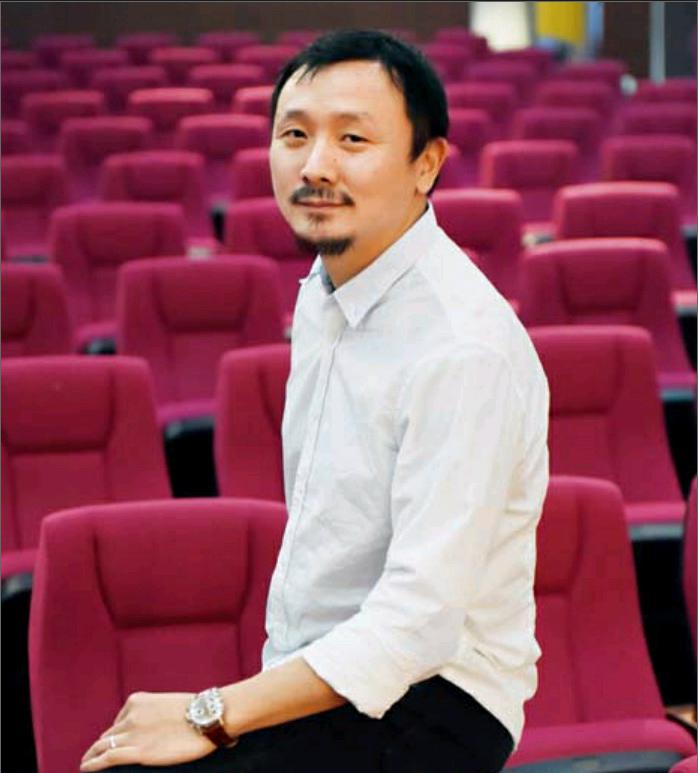Huang Jixin:Building the Search Engine of the Future
2016-05-28byXuZhiyuan
by+Xu+Zhiyuan

“The Communist Manifesto was first written in German,”remarked Huang Jixin, cofounder and CEO of Zhihu.com, a Chinese knowledge sharing and production website. His virtual manifesto is hardly hindered by its Chinese language environment; Zhihu has become one of the worlds most important knowledge production bases.
His stunning remark was actually a manifestation of his growing confidence in Zhihu. If a 19th Century work of political theory could spread globally, it must be possible for a modern Chinese knowledge base to transcend linguistic limitations. Shortly after creating Zhihu, Huang brought explosive growth to the online knowledge sharing community.
In 2010, Huang and his friends Zhou Yuan and Li Shenshen launched their blogging portal “apple4us,” the predecessor of Zhihu. Initially, users of the website were specialists who discussed the worlds latest trends in science and technology, which made it similar to Quora, a question-andanswer website headquartered in Mountain View, California, in Silicon Valley of the United States. In the first two years after its inception, Zhihu was only open to users who received an invitation to maintain a professional atmosphere. The website opened to all registered users in March 2013. Quickly, the scope of topics discussed grew considerably. By May 2015, registered users exceeded 20 million, and daily active users averaged 5 million. Zhihu has become one of the largest online knowledge sharing communities in the world.
To some extent, Zhihu builds on concepts of Wikipedia and Quora – all three are practitioners of “cognitive surplus,” a term coined by Professor Clay Shirk from New York University. In a world so highly connected by the internet, people can use their spare time to create things through individual or collaborative activities, while gaining a sense of participation, community and creativity in the process. This huge group of people continues growing and producing incredible achievements.
Huang and his partners have likened Zhihu to a “super printer.” At first, emergent technologies may cause disorder, just as todays information revolution did. Then, a new order gradually takes shape and begins creating new habits and social structures. Huang and his Zhihu just mirror such a transformation.
Before 2008, Huang was a broadminded, diligent, tremendously curious journalist. He devoted all his talent and enthusiasm to seeking knowledge, but his efforts were not efficient. He quit the news industry and joined Innovation Works, a business incubation platform founded by Kai-Fu Lee, former vice president of Google and Microsoft.
Seven years passed, and it is clear that Huang made the right choice. After his accomplishments at Innovation Works, Huang and some partners established Zhihu in 2010. Importantly, all of his idiosyncrasies such as disjointed knowledge reserves, infinite patience with others, unsatisfied curiosity and tendency to showboat seem to perfectly match with Zhihu.
Where did you get the idea of launching a knowledge sharing platform?
Huang: Everything begins for a few different reasons. Zhihu is no exception.
I founded the blogging website “apple4us” in 2007. Zhou Yuan and I were writing for it. After a while, we began brainstorming ways to attract more people with shared interests to join us.
When I was an investment manager at Innovation Works, I witnessed the success of open source software and realized that making state-of-art products is most important for hi-tech startups. Facebook was founded by only four people, and Twitter by three. Innovation Works began to incubate similar startups in China. However, we found that Chinese startups were not efficient with mutual sharing. The idea of building a platform on which all startup entrepreneurs could share knowledge came to us.
We also launched Zhihu thanks to inspiration from Quora. Despite being a well-trained writer, its difficult for me to maintain passion for writing for an extended period of time, and Im delighted to answer questions succinctly on Quora. People do have demands to share their own knowledge, which in turn helps them learn from others.
Zhihus registered users number more than 20 million. What are these people like?
Huang: When Zhihu launched, we were already confident about its success. Zhihu inspires users to deliver high-quality answers. Essentially, it is a social networking platform, with content as the carrier for users to communicate with each other. When helping others find answers, people feel a sense of purpose. This is the spirit of Zhihu.
Zhihu users are interesting in a lot of ways. A typical Zhihu user is often very curious and passionate about the world, earnest, and opposed to cynicism and antiintellectualism. More importantly, they are usually funny. Many of Zhihu users are elites in realms of mass entrepreneurship and innovation. With their successes and experiences, they can exert tremendous influence on others. This facet particularly excites me.
What is your wildest fantasy about where Zhihu goes?
Huang: If I let my imagination run wild, I see Zhihu becoming the search engine of the future. That isnt a reality yet, but its value will only multiply in the future. Today, no search engine can search things existing in human brains. What Zhihu does is explore valuable information from everyones brain through social networking.
Three years ago, Zhou Yuan, Li Shenshen and I once discussed the future of Zhihu. Then, I opined that Google merely indexes one percent of human knowledge, and doesnt produce any knowledge. It would be an infinitely beneficial contribution to mankind if Zhihu could produce, record and document one percent of human knowledge reserves.
Currently, English is the most used language globally. So, is it possible for the Chinese-language site Zhihu to become the worlds largest knowledge sharing platform?
Huang: The Communist Manifesto was initially written in German. If the future leads to a better life for mankind and Zhihu contributes only a tiny slice of the dream, we can consider Zhihu the best in its field.
From the bottom of my heart, I believe Wikipedia is the greatest internet product. Due to timely updating, participation of voluntary users, and conformity to moral boundaries and rules, it has formed a powerful platform of common knowledge. To a large extent, Wikipedia only quotes authoritative sources. If not, any information must be accompanied by relevant declaration. Unlike Wikipedia, Zhihu pools the wisdom of various people to find answers to certain questions based upon personal experiences, thus offering knowledge from different perspectives.
How do you evaluate Zhihus social influence?
Huang: Frankly, we – the three founders of Zhihu – are all idealists. Zhihu is, on one hand, a platform for professionals to spread their voices, and on the other hand, a place to recognize others value while sensing ones own value from those who recognize it. This is an ideal way to establish and expand high-quality social networks. It is costly to find helpful people offline, but easy and free online.
Moreover, we are participating in the construction of a better future. Zhihu facilitates the flow of professional knowledge and has mechanisms to guarantee its quality. This is a beautiful thing.
